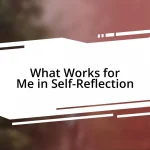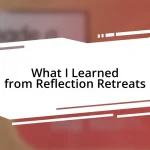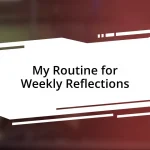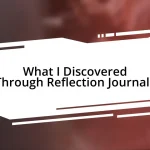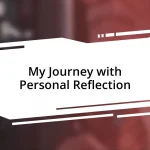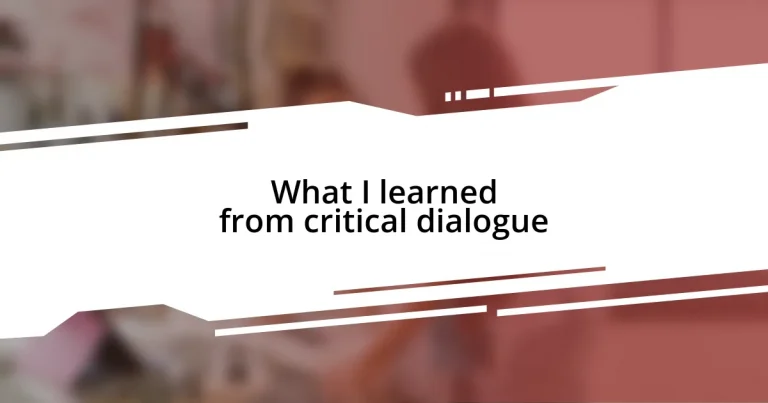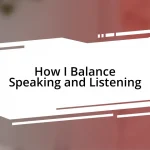Key takeaways:
- Critical dialogue promotes open exchange, vulnerability, and active listening, leading to deeper understanding and collective learning.
- Effective communication techniques, such as asking open-ended questions and using “I” statements, enhance connection and foster empathy in conversations.
- Building trust through vulnerability, follow-through, and consistency strengthens relationships and encourages meaningful exchanges.
- Active listening transforms dialogues, creating space for insights and emotional support, which can significantly impact personal and professional interactions.
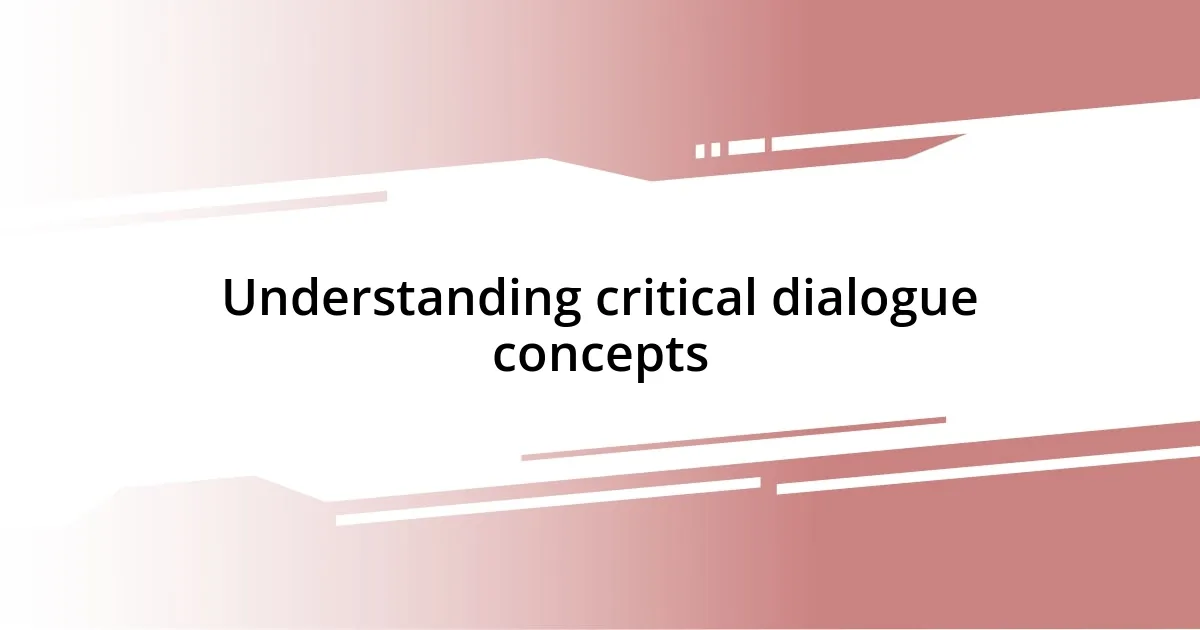
Understanding critical dialogue concepts
Critical dialogue centers around the idea of open exchange, where participants share perspectives and challenge each other’s views in a respectful manner. I vividly remember a time in a university seminar where we explored controversial topics. The tension in the room was palpable, but when we engaged in critical dialogue, it transformed into a space of collective learning. Isn’t it fascinating how conflict can lead to understanding?
At its core, critical dialogue requires vulnerability. I learned that sharing personal experiences enhances the conversation. Once, I opened up about my struggles with bias in a group discussion, and it not only encouraged others to speak but deepened our collective understanding. Have you ever considered how vulnerability can be a strength in fostering meaningful connections?
Active listening is another fundamental component of critical dialogue. There was an instance when a colleague pointed out my oversight during a project discussion. Rather than feeling defensive, I chose to listen intently. This experience taught me how embracing feedback can immensely enrich our dialogues. How often do we let pride hinder our growth?
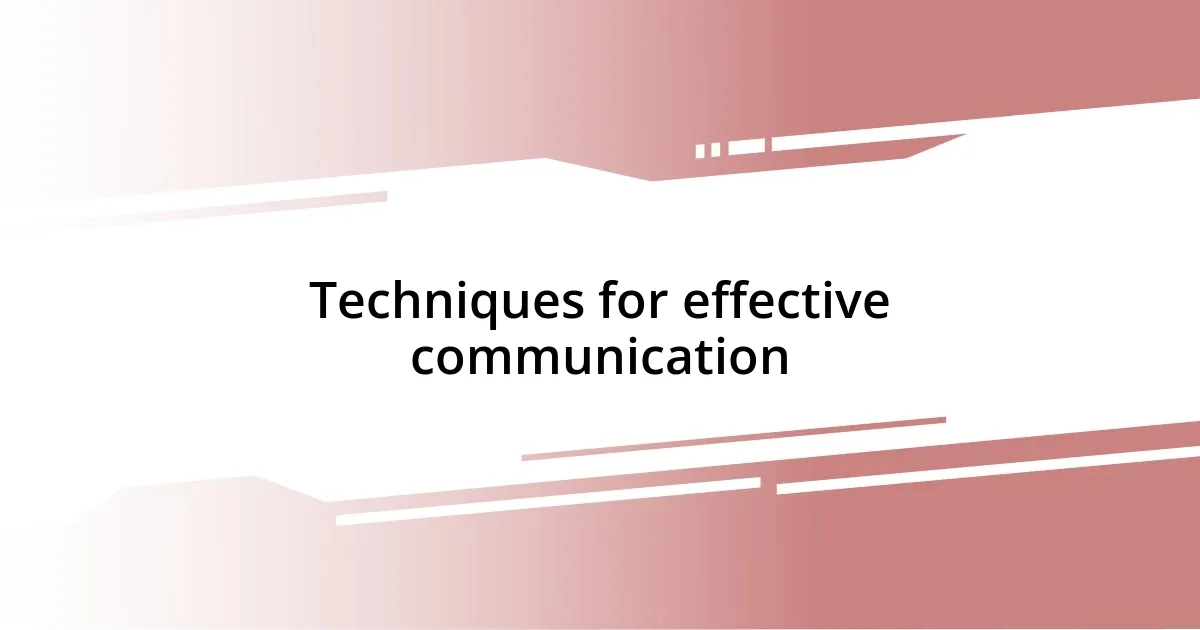
Techniques for effective communication
Effective communication hinges on a few crucial techniques that elevate conversations and foster genuine connection. One of my favorite methods is asking open-ended questions, which encourages deeper exploration of ideas. I recall a discussion with a friend about our different viewpoints on social initiatives; instead of asking yes or no questions, I asked what inspired their beliefs. This shifted the dialogue, allowing us to understand each other’s motivations better. Isn’t it incredible how a simple question can unlock new dimensions in a discussion?
Here are some techniques that have consistently proven effective in my experience:
- Active Listening: Make a conscious effort to listen without planning your response while the other person is speaking. Acknowledge their feelings and viewpoints sincerely.
- Empathy: Try to step into the other person’s shoes. This not only validates their perspective but also paves the way for a more compassionate dialogue.
- Clarification: Don’t hesitate to ask for clarification when something isn’t clear. This shows genuine interest and helps prevent misunderstandings.
- Body Language: Be aware of non-verbal cues. Maintaining eye contact and using open body language can significantly enhance the perception of engagement.
- Reflective Responses: Paraphrase what the other person said to confirm understanding. I find this technique helps in building rapport and establishing trust during discussions.
These techniques have helped me create a more enriching dialogue experience that goes beyond just exchanging words. They remind us all that communication is not just about speaking; it’s about connecting.
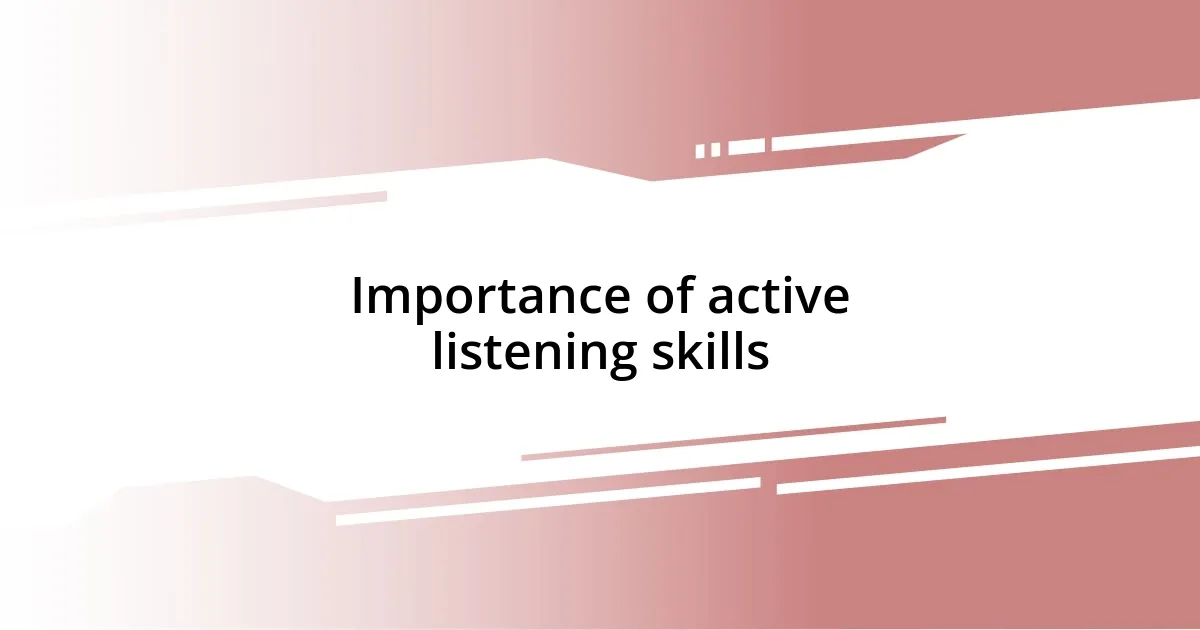
Importance of active listening skills
Active listening skills are crucial in fostering meaningful dialogues. I remember a team meeting where a colleague shared a complex issue they were facing. Instead of immediately jumping in with my thoughts, I took a moment to genuinely absorb what they were saying. That simple act of listening not only made my colleague feel valued but also led to insights I hadn’t considered before. Isn’t it surprising how much we can learn when we truly focus on others rather than ourselves?
Listening actively means being fully present. I’ve experienced moments where distractions, like checking my phone, diminished the quality of a conversation. When I made a conscious effort to eliminate those distractions, the outcomes were profoundly different. The connection felt stronger, and solutions emerged more collaboratively. Can you recall a time when you sensed someone wasn’t really listening? It makes a world of difference when the other person is engaged.
Moreover, active listening fosters empathy. In one emotional discussion I had with a friend going through a tough breakup, the act of listening transformed the conversation. I reflected back on their feelings, which opened doors for them to express vulnerabilities. By holding space for their emotions, I helped them feel heard and understood. How powerful it is when simply listening can help someone feel less alone?
| Active Listening Skills | Effects |
|---|---|
| Being fully present | Enhances understanding and trust |
| Eliminating distractions | Promotes deeper engagement and connection |
| Reflecting emotions | Fosters empathy and support |
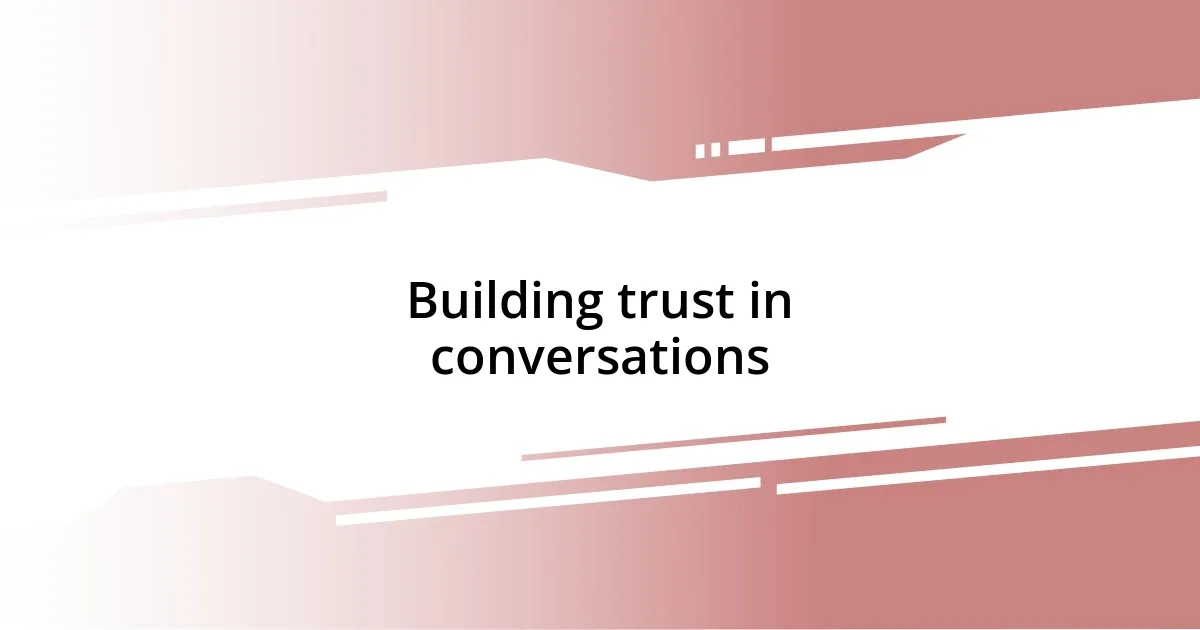
Building trust in conversations
Building trust in conversations is essential for any meaningful exchange. I’ve found that sharing a bit about myself can often invite the other person to open up as well. For instance, during a discussion about career aspirations, I shared my own fears and failures. This vulnerability created a safe space where my friend felt comfortable expressing their challenges. Isn’t it fascinating how trust can flourish through honesty?
Another aspect I’ve noticed is the importance of follow-through. After a conversation where a friend confided in me about their struggles at work, I made sure to check in a few days later. This small gesture reinforced that our dialogue was not a fleeting moment but something significant. When people see that you care enough to follow up, trust begins to solidify, doesn’t it?
Lastly, I believe consistency plays a pivotal role in building trust. I make it a point to be genuine in all my interactions. There was a time when I had to confront someone about their behavior that affected our team dynamics. By approaching the conversation with integrity and respect, I not only addressed the issue but strengthened our relationship. Trust grows when people know they can rely on you to be honest—what could be more valuable in a conversation?
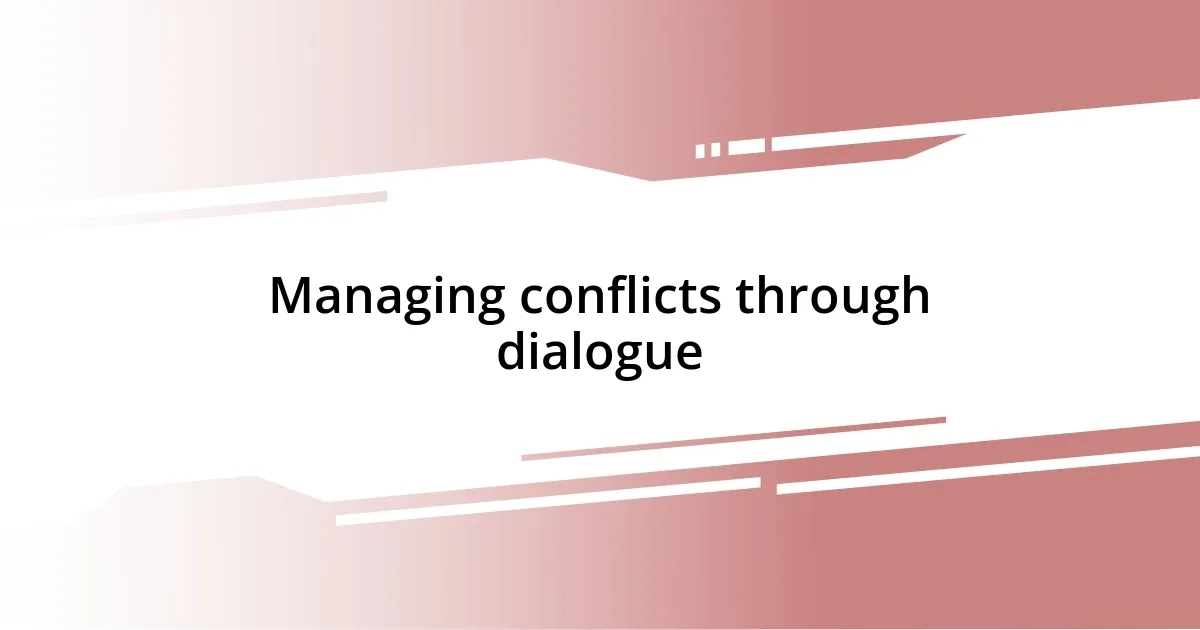
Managing conflicts through dialogue
Navigating conflicts through dialogue can often feel daunting, but I’ve found it’s all about maintaining a calm demeanor. There’s a situation I faced during a project dispute; emotions ran high as team members voiced differing opinions. Instead of letting the tension escalate, I initiated a round where everyone could share their thoughts without interruption. It was mesmerizing to witness how simply creating a structure for dialogue turned frustration into mutual understanding.
When I think about managing conflicts this way, I realize that framing the conversation can make a significant difference. For instance, using “I” statements proved invaluable in a disagreement with a colleague. I expressed how their actions affected my work instead of placing blame. The shift in language brought a sense of ownership to the discussion, making it easier for us to find common ground. Have you ever noticed how a slightly altered approach can change the whole vibe of a conversation?
Moreover, I’ve discovered that asking open-ended questions can unlock deeper insights. During a heated discussion about project deadlines, I started asking my teammates what challenges they faced rather than defending my own stance. This small pivot in questioning allowed everyone to voice their concerns without feeling attacked. Seeing the relief on their faces as they articulated their frustrations reminded me that dialogue, when done right, can be a powerful tool for conflict resolution. Doesn’t it feel satisfying when a tough conversation leads to a clearer path forward?
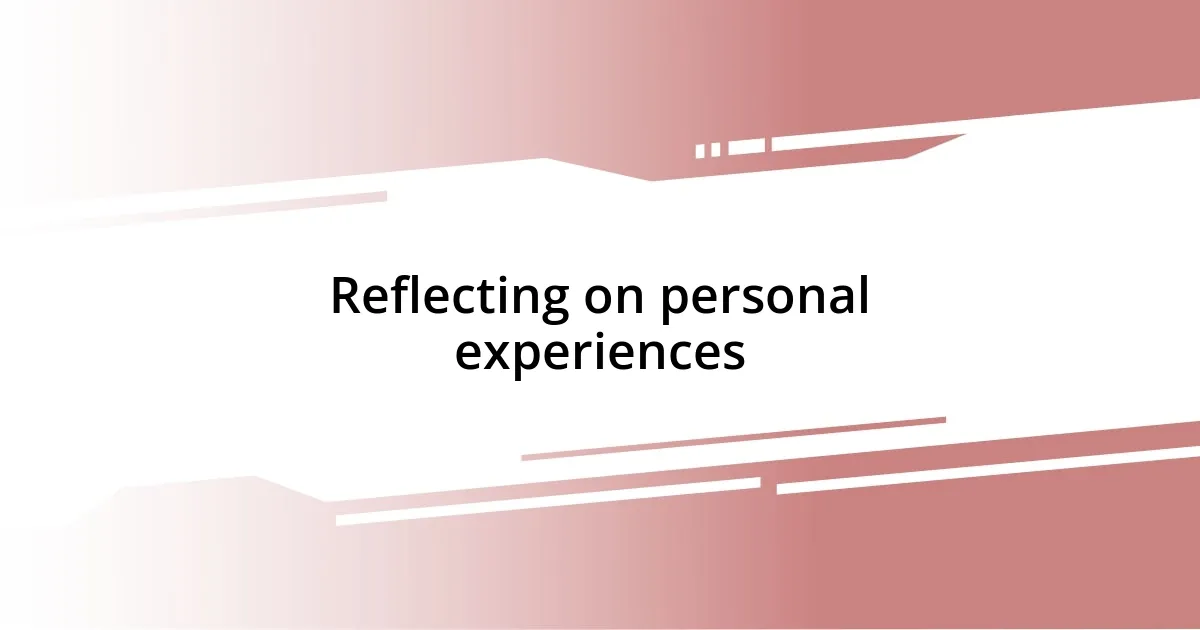
Reflecting on personal experiences
Reflecting on my personal experiences during these critical dialogues has been quite eye-opening. I recall a time when I was discussing sensitive family matters. As I recounted a heartfelt story about my own childhood struggles, I felt a wave of emotion wash over me. It struck me how vulnerability can connect us on a deeper level—have you ever felt that kind of raw honesty bring you closer to someone?
One experience that stands out involved a mentor-mentee relationship. I made it a point to share my journey, including the hurdles I faced in my career, hoping to inspire my mentee. The moment they responded with their fears about the future, I realized that this exchange wasn’t solely about teaching but about mutual growth. Isn’t it powerful to see how our stories can intertwine and create a shared path forward?
In another instance, I led a discussion focused on mental health at a community gathering. As I opened up about my own battles with anxiety, I noticed the shift in the room. The once-quiet attendees began to share their experiences, realizing they weren’t alone in their struggles. It was a vivid reminder that when I reflected on my own experiences, I inadvertently encouraged others to do the same. How often do we underestimate the impact our narratives can have on those around us?
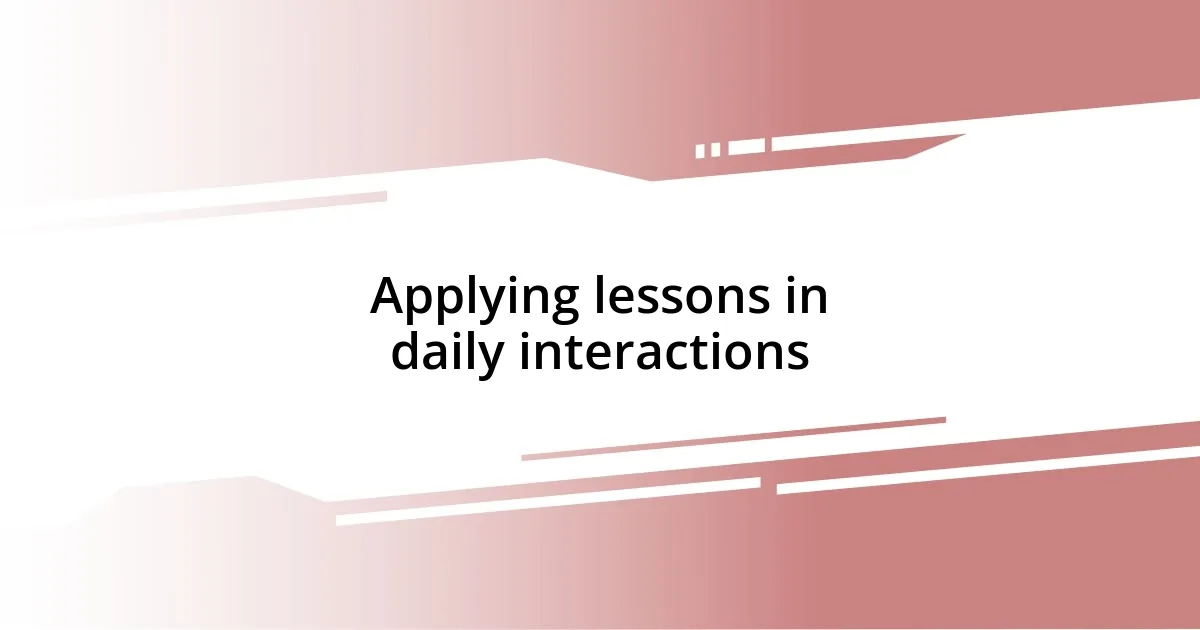
Applying lessons in daily interactions
Engaging in daily interactions with the lessons learned from critical dialogue has transformed how I connect with others. For instance, just last week, while catching up with a friend over coffee, I consciously chose to apply active listening techniques. Instead of formulating my response while they spoke, I focused fully on understanding their perspective. This not only deepened our conversation but also revealed layers of their experiences that I hadn’t noticed before. Have you ever found that simply listening can elevate a relationship?
In another situation, I attended a community workshop where participants were sharing personal stories. I remembered the power of empathy and decided to share a difficult experience of my own regarding a recent job search. Surprisingly, this openness encouraged others to share their challenges too, creating a space filled with support and encouragement. It struck me that vulnerability doesn’t just foster connection; it transforms the atmosphere completely. Isn’t it fascinating how sharing our struggles can lead to collective healing?
Moreover, I’ve embraced the practice of giving constructive feedback in my daily work interactions. I once had a team member who was feeling discouraged about their performance. Instead of just highlighting the areas needing improvement, I folded in affirming comments about their strengths. By balancing critique with recognition, I watched their confidence bloom right before my eyes. Seeing how a little shift in my delivery can uplift someone else’s spirit makes me believe that we truly have the power to inspire with our words. Don’t you agree that a small tweak in approach can lead to monumental changes in someone’s day?

